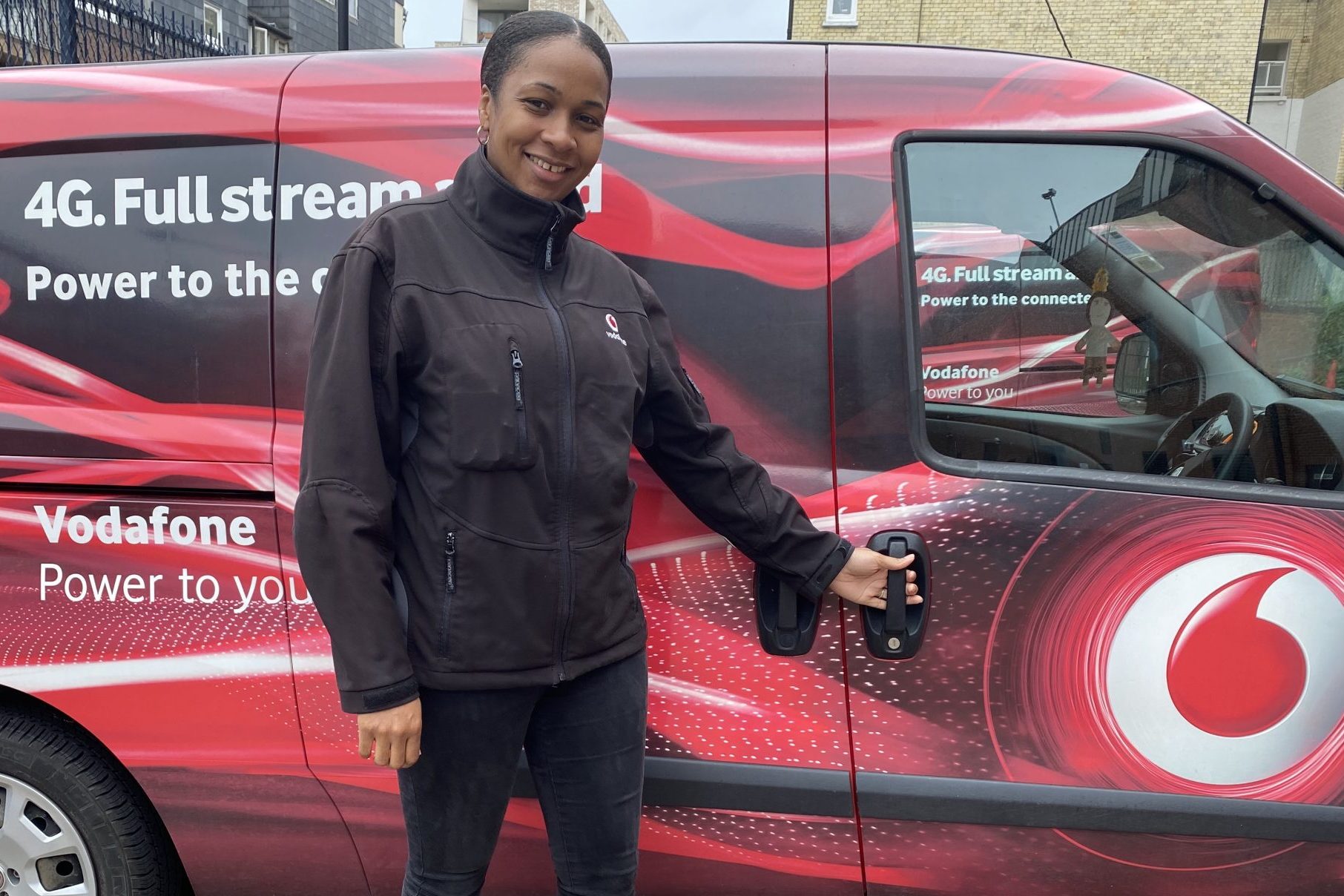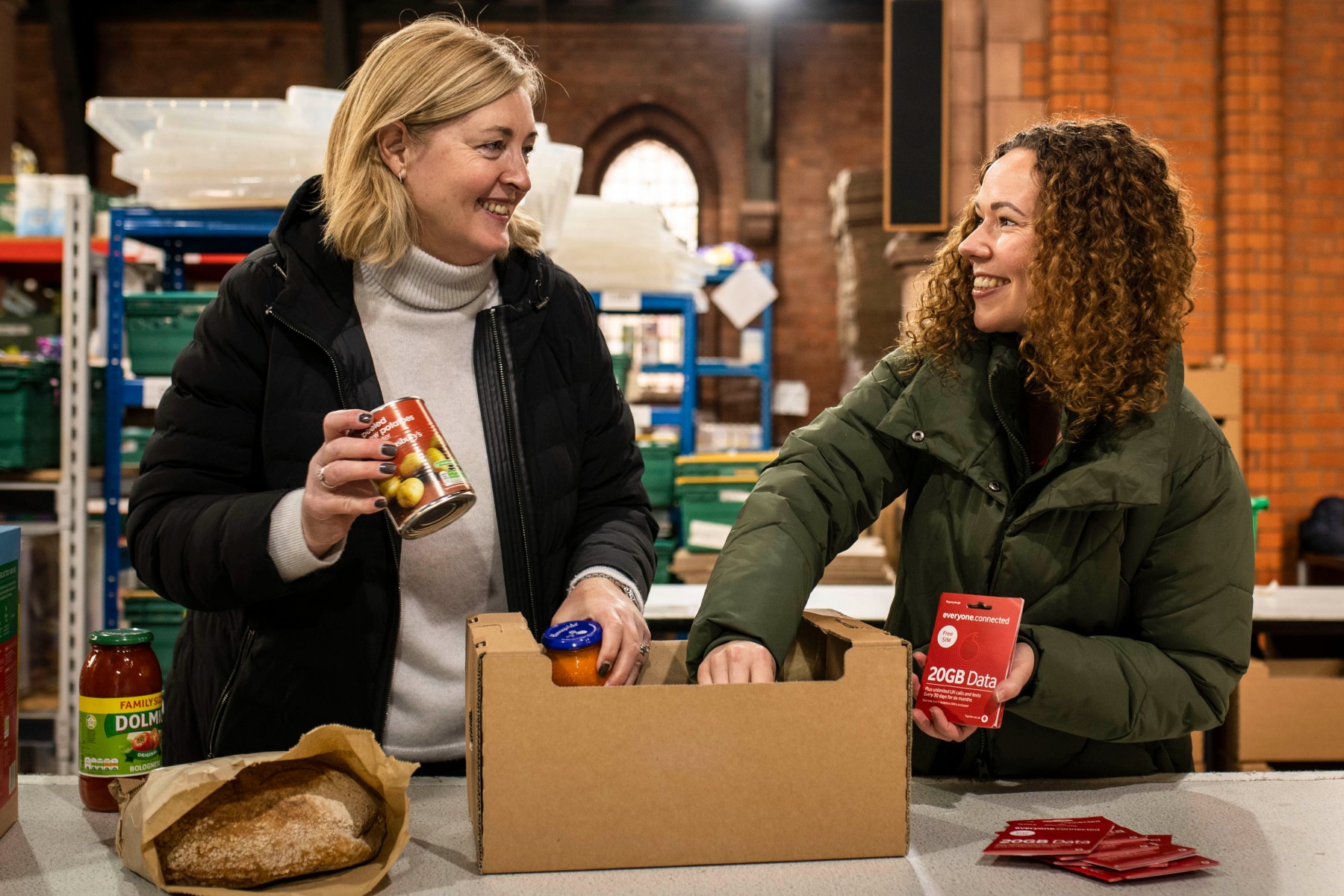
Natasha Carpenter, an award-winning Vodafone engineer, reflects on how to attract more women in to the industry and shares her experiences of keeping the UK connected during the coronavirus pandemic.
When Natasha Carpenter looks back 11 years to when she was a legal secretary, she can’t believe how far she has come in that time.
Now she’s a winner of the Institution of Engineering and Technology (IET) Young Woman Engineer of the Year special recognition award, and also a recipient of a special recognition reward from Vodafone.
As an experienced engineer specialising in fixed-lined telephony for commercial customers, she and her colleagues have been keeping UK businesses connected during the coronavirus pandemic.
Young apprentice
It was applying for a Cable & Wireless (now part of Vodafone) apprenticeship that changed her life.
“I was just doing the same thing every day as a secretary, but this apprenticeship looked really interesting. I didn’t know anything about telecoms but I was interested in technology and how things worked,” she tells Vodafone UK News.
Careers advice at her school in Essex pushed her towards office work, says Natasha, based on a sexist assumption that “girls didn’t really do this kind of stuff”.
She admits that her line of work is still very male-dominated, which is why she’s so keen to spread the message – particularly to girls – that “no matter what you look like, your race, your gender, you can be an engineer if you want to”.
I want to show people what the future could look like…it’s exciting!
Initially, customers couldn’t believe she was the engineer when Natasha turned up to a job.
“They didn’t have much confidence in me at first,” she says. “It was a bit discouraging – but you just had to keep going and ignore what they said.”
Thankfully, attitudes have changed over the last decade, due in part to the efforts of pioneers like Natasha getting out there, doing the job, and spreading the message in schools, workplaces and conferences.
“Now they’re far more welcoming and encouraging,” she says. “There’s been a shift in mentality – now people say it’s nice to see a female engineer.”
And Natasha is keen to stress that her Vodafone colleagues “have always been very helpful and supportive”.

The apprenticeship gave her the opportunity to learn about electronics, telecoms, maths, and health & safety, she says, and all about the other equipment manufacturers, such as Cisco, Juniper, and Marconi, and where their kit fitted in to the complex network.
Natasha learned her trade in and around London, practising on training networks laced with deliberately engineered faults, she says. Then after Vodafone acquired Cable & Wireless in 2012, “things got really busy”.
“What I love about the job is that you’re not just installing kit, you’re maintaining it as well. And you’re meeting customers almost every day. There’s always variety, something new.”
Life under Covid-19
Of course, the coronavirus pandemic has necessitated many changes to working practices.
“We have to wear PPE [personal protective equipment], use hand gel, and anti-bacterial wipes,” Natasha explains, “and we’ve reduced the number of people visiting network sites at the same time to adhere to government guidelines.”
Lockdown has also changed home life, with her 14-year-old son, Javon, having to carry on his education at home with the help of her dad and brother while she and her partner go to work.
So does she get lonely out on the road, often working by herself?
“I’m quite happy in my own company,” she says. “You used to see customers and chat to them, but at the moment we’re only doing critical work so we don’t see as many people as usual.
“But you’ve always got someone to talk to on the phone when you want to.”
And Natasha is particularly proud of the role engineers have played in keeping the UK connected during the pandemic.
“If you hadn’t had people like us going out there your phone or broadband wouldn’t have worked. The NHS workers are heroes, of course, but we’re heroes, too,” Natasha concludes.
Fortunately, Natasha says she hasn’t received any personal abuse from anti-5G protestors or 5G coronavirus conspiracy theorists as she’s gone about her work, but she’s glad to have had Vodafone’s lone worker app to hand, with its movement detection, two-hour check-ins and panic button facilities.
When she’s not installing network routers and switches, or connecting businesses to the cloud, Natasha is learning about the mobile side of the business, too.
“It’s always good to add to your skill-set and keep yourself constantly fresh,” she reflects.
Creating the future
With just one more female Vodafone engineer in the London region where Natasha works, progress in attracting women to these roles is not as fast as she would like, she admits, but she’s pleased to see more women coming through the apprenticeship programme.
“People think they know what an engineer looks like, but they don’t. This is why I do speeches in schools and colleges and challenge the prejudices of the people I talk to.”
Natasha is a member of the IET and STEM.org.uk, an organisation supporting learning in science, technology, engineering and maths. She is regularly invited to speak in schools, colleges, at conferences and seminars.
“We need more people like me changing perceptions,” says Natasha. “I want to show people what the future could look like, a future that they could help create using technologies that haven’t even been invented yet. It’s exciting!”
“In five or 10 years we might be using 6G, watching hologram TV, or buzzing around in flying taxis – all of these technologies will need fast connectivity to work.
“And people like us to install it.”
![stock image of a refuse collector and a wheelie bin in front of a bin lorry [Adobe Stock] stock image of a refuse collector and a wheelie bin in front of a bin lorry](https://www.vodafone.co.uk/newscentre/app/uploads/2024/07/Garbage-Removal-Man-Adobe-Stock.jpg)

![Front view woman and man wearing sunglasses [Adobe Stock] cropped edited stock image of a woman and man, both wearing sunglasses, taking a selfie using a smartphone while posing by the waterside](https://www.vodafone.co.uk/newscentre/app/uploads/2024/07/Front-view-woman-and-man-wearing-sunglasses-Adobe-Stock-cropped-edited.jpg)


![Young woman waiting for job interview indoors [Adobe Stock] stock image of a young woman waiting for job interview indoors](https://www.vodafone.co.uk/newscentre/app/uploads/2024/06/2-Young-woman-waiting-for-job-interview-indoorsAdobe-Stock.jpg)



![black and white photo of a girl's face with smoke [Adobe Stock] an AI-generated stock image of a girl's face partially covered in smoke](https://www.vodafone.co.uk/newscentre/app/uploads/2024/05/black-and-white-photo-of-a-girls-face-with-smoke-Adobe-Stock.jpg)